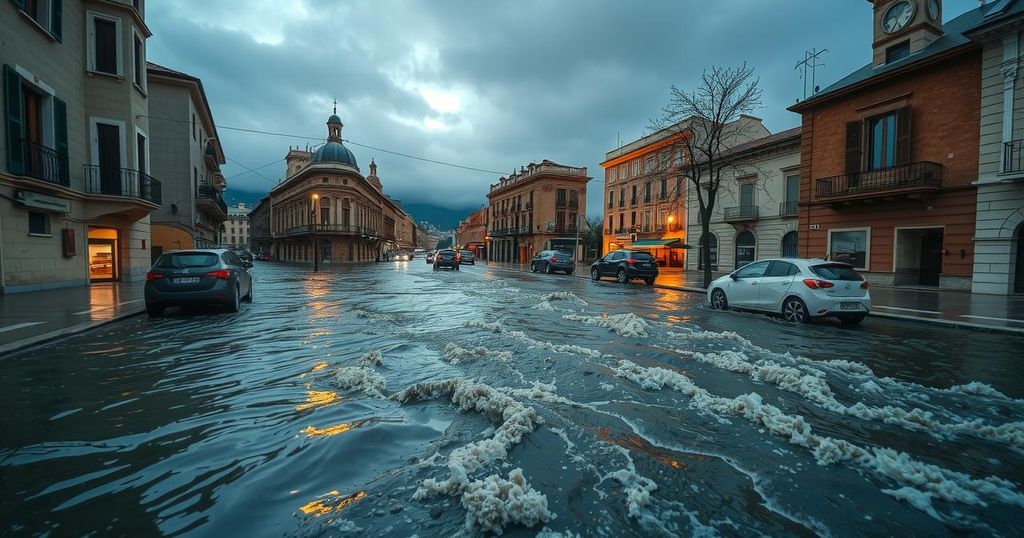Spain’s Floods: The Urgent Need for Climate Change Preparedness

The severe floods in Spain, exacerbated by climate change, resulted in significant fatalities and revealed critical weaknesses in the country’s infrastructure and emergency preparedness. The Mediterranean’s vulnerability to extreme weather highlights the urgent need for comprehensive climate action and infrastructure innovation globally. As nations prepare for the UN COP29 climate summit, emphasis must be placed on reducing emissions and enhancing readiness to mitigate future disasters.
As climate change dramatically increases the frequency and severity of extreme weather events, the recent floods in Spain serve as a dire warning of the future hazards that lie ahead. The tragic flooding, particularly in the eastern Valencia region, resulted in the loss of at least 158 lives and highlighted the perilous consequences of human-induced climate change. Research from World Weather Attribution indicates that climate change has made rainfall in this region approximately 12% heavier, significantly escalating the frequency and intensity of storms. This phenomenon is exacerbated by the warming atmosphere, which retains more moisture, thereby intensifying downpours and causing devastating floods. The Mediterranean region, including countries like Spain, Italy, and Greece, exemplifies the alarming impact of climate change, as it encounters unique geographical and climatic challenges that predispose it to extreme weather. The recent weather system, known as DANA, illustrates how warm Mediterranean waters can generate catastrophic downpours in conjunction with atmospheric disturbances. Early warning systems, while informative, proved inadequate in preventing human fatalities during this disaster, underscoring the urgent need for comprehensive preparedness measures, including robust public education and efficient emergency response strategies. Furthermore, the dual threat of drought and flooding has emerged as a significant challenge, particularly in areas such as Chiva near Valencia, where residents experience a year’s worth of rainfall within a matter of hours. The increasing intensity of these extreme weather events is directly linked to the alterations in the water cycle caused by fossil fuel pollution, leading to common occurrences of both chronic droughts and sudden heavy rainfall, which compound the impact of each other. The recent floods laid bare the vulnerabilities of Spain’s infrastructure and emergency response systems, indicating critical gaps in preparedness that resulted in tragic consequences. European leadership has expressed an urgent need for enhanced crisis response capabilities and a strategic framework within actionable policy measures at all governance levels. Acknowledging that awareness is insufficient, a shift to proactive action is required to significantly improve community resilience against such events. Innovative methodologies, including the construction of flood-resistant infrastructures and improved drainage systems, have shown effective results in countries such as Japan and the Netherlands, which have successfully minimized disaster risks in high-risk areas. Tackling the climate crisis on a global scale necessitates collective action and collaboration among nations to address greenhouse gas emissions and implement sustainable energy solutions. As the impending UN COP29 climate summit approaches, it is imperative for nations to reaffirm their commitments to emission reduction targets to alleviate the effects of climate change. The floods in Spain and similar tragic events across the globe serve as stark reminders that the climate crisis demands immediate action and comprehensive planning to safeguard lives and mitigate future tragedies. It is clear that the time for mere awareness has passed; now, the focus must shift decisively towards concerted actions that foster climate resilience on both regional and international levels.
The article addresses the compounded effects of climate change as illustrated by the recent floods in Spain, which resulted in significant loss of life and showcased the inadequacies of current infrastructure and emergency preparedness. It elaborates on the factors contributing to intensified rainfall and the rising probability of extreme weather occurrences, driven by anthropogenic climate change. The Mediterranean’s unique climatic and geographical conditions are emphasized as particularly vulnerable to climatic volatility. By linking various elements such as urban development, environmental policies, and proactive measures taken by other nations, the piece suggests a holistic view on addressing these calamities. Moreover, it frames the upcoming climate summit as a pivotal moment for nations to commit to global efforts against climate change.
In summary, the catastrophic floods experienced in Spain illuminate an urgent need for increased climate change preparedness globally. Emphasizing the necessity of transforming awareness into decisive actions, the piece calls for robust infrastructure improvements, enhanced community resilience strategies, and international cooperation to combat climate change. With immediate action paramount, it is crucial for governments worldwide to prioritize climate readiness and infrastructure investment to protect their citizens from increasingly severe climatic events.
Original Source: www.policycircle.org






